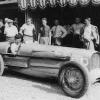
Microfilm newspaper research in libraries
#1

Posted 19 April 2001 - 06:34
At the moment, I am doing some informal research on Australian
speedway racing of the late 1940's and early 1950's, which
has involved spending time looking at the Sydney newspapers
of the time at the State Library of NSW.
Would anyone like to share some of their favourite discoveries that they have found in newspapers?
They are an absolute treasure trove of information and results:)
Advertisement
#2

Posted 19 April 2001 - 08:54
Marco.
#3

Posted 19 April 2001 - 10:56
It's a beginning. Hope to find interesting stuff but I must be patient.
I was amazing by the use of microfilms and the handwritten index cards. Where is the computer ?
I've taken a one year subscription.
#4

Posted 19 April 2001 - 12:44
I have found out there have been some racing on the roads around here i the 30's for motorcycles, possibly with some cars also taking part!
Stefan
#5

Posted 19 April 2001 - 16:52
#6

Posted 19 April 2001 - 16:55
#7

Posted 19 April 2001 - 17:17
I share Hans's comments regarding distraction and the quaint advertising.
One thing though - if I spend too long (more than 30 mins at a time) scrolling with the microfilm, "sharpening images", and tilting the "landscape" pages to "portrait" I tend to get seasick.
#8

Posted 19 April 2001 - 19:28
#9

Posted 20 April 2001 - 02:41
Originally posted by ry6
One thing though - if I spend too long (more than 30 mins at a time) scrolling with the microfilm, "sharpening images", and tilting the "landscape" pages to "portrait" I tend to get seasick.
I know the feeling!
The other "technical" problem is whether or not you
use a hand-cranked or automatic fast forward
on the reader. Rewinding a whole roll of film with
a hand-crank can be very tiring.
While it does get boring rolling through lots of pages,
finding a nugget of information makes all the work
worthwhile. The research is also like a jigsaw puzzle,
in that you put together all of the bits you have found
to make a coherent story.
My high point was researching the now defunct Windsor
speedway in north-western Sydney for the 1949/50
opening season, and finding amongst the speedcar
drivers who competed one "J Brabham", who went
on to bigger and better things
#10

Posted 20 April 2001 - 09:40
And the 1936 Woody Point research led me to the information that the 1940 Olympic Games site was to be... Tokyo!
All too interesting, I'm afraid, too much to look at, too little time... but one bloke has done it as therapy after a heart operation, looking for speedway stuff from all over Australia, principally, and kept records of it all... you might like to contact him, Graham.
#11

Posted 24 April 2001 - 01:25
In the same article, Stirling Moss dismissed the idea as "preposterous"...
#12

Posted 24 April 2001 - 01:55
in case anyone is thinking of doing some
microfilm research
a) before you start searching, have at least a reasonable
idea as to when the event you are researching is taking
place. The year and month would be a good start.
b) as well as the major daily national newspapers,
a local paper can be a very good source of material.
c) try and get coverage from at least 2 different
sources. I have found that the coverage not only
varies from newspaper to newspaper, but within
the same newspaper from meeting to meeting.
d) be prepared for mis-spelt and incorrect names of
competitors!
e) while the results can be found in the paper
immediately after the event, there might be some
articles written in the week before the event.
f) as well as newspaper articles, the promoters
will often advertise the meetings as well. This can
give you the following information
i) when the race(s) were held
ii) time and location of meeting
iii) categories of cars
iv) names of some "star" drivers.
v) prizemoney and types of races
g) as with the media today, an accident
or injury will often get publicity, especially
in the "front" of the paper, rather than the
"sports" section at the back.
h) if there are no "feature" articles in the
Monday paper, check the sports summary
section, where the brief results are listed
of all the sports that took place in the area
on that weekend.
i) Copying of information
Some microfilm readers allow printed
copies of the microfilm. According to the
information found, it may be easier just to
transcribe the information.
If you do transcribe, PRINT legibly!
You will be referring to thse notes
again in the future, so you have to
be able to read them.
Regardless of whatever form you use,
take a note of the date of issue of the
newspaper, so that you can easily
find it again if need be.
The newspapers can provide lots of excellent
information, especially in regard to the
"nuts and bolts" of where and when meetings
occurred. The human memory can sometimes
be a little faulty in regards to remembering where
and when a race took place.
Happy researching!
Graham














